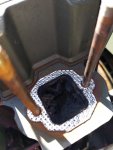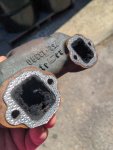I retired from the local transit company here 2 years ago. The first time that I saw "wet stacking" was at work. We have a crew of people whose glorious job is to clean the inside of these buses. I'm here to say that their job is the toughest in all. Most of them work the graveyard shift when the buses are in the yards. In the summertime, the inside of these buses can be very warm. Conversely, in the wintertime they can be very cold. They will run the buses on fast idles while they're working on them to maintain a decent climate control inside of the buses. Their job takes about 4 - 5 hours per bus when done correctly. At mileage intervals, the buses are brought in for their preventative maintenance inspections. If a bus is brought in for a PM right after an inside wash, the inspector will usually always write them up for a bad turbo charger, because the exhaust will be dripping with oil. I wish that I had 1/2 of the money that has been spent on replacing good turbo chargers over the years. I would be rich! The truth is, the buses just needed to be put back into service under a good load, and the oil would simply burn off. Try to explain that to a parts changer though!
It seems that the naturally aspirated gensets tend to wet stack more so than the turbo charged ones do. At least that's been my experience with them so far. But none the less as has been suggested above, the best thing to do is simply run your genset as you need and don't worry about a light load. When your mainline power comes back on, simply run the genset for a while with an artificial load of some sort to burn out the excess oil if there is any. I've become a fan of using a brine tank to load test my generators. It's simple, it's cheap and it's effective. Google it and check it out. I can bring my generators to their knees without a bunch of expensive equipment, and it's also very accurate and precise. The only thing is, as the brine mixture temperature goes up, so does the resistance and thus the amperage. So, I have to stay with it for a few minutes to make sure that I don't go over-current.





